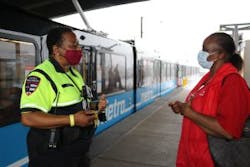New tools help keep St. Louis Metro Transit safe
St. Louis Metro Transit has announced new tools for its public safety team.
Since July 20, all uniformed and field deployed St. Louis Metro Transit Security Specialists (TSS) have been equipped with body worn cameras. In addition, St. Louis Metro Transit’s new Ride and Abide Policy will allow the Public Safety Team to suspend transit privileges for individuals who repeatedly engage in prohibited conduct on the system.
Body worn cameras
New body cameras are now being worn by St. Louis Metro TSS during each shift for scene documentation, as well to ensure transparency and accountability to the public when addressing security issues.
The cameras provide a more thorough documentation of customer contacts, as well as special incidents that require a TSS response. Local law enforcement partners will also have access to the camera footage when conducting their investigations on the St. Louis Metro Transit system. This technology will supplement St. Louis Metro Transit’s broader closed-circuit television (CCTV) system, which deploys fixed cameras on all platforms and properties across the system. Those cameras are monitored 24/7 by metro public safety dispatchers who can immediately call for security or law enforcement assistance when needed.
St. Louis Metro Transit acquired the cameras under a five-year lease program with AXON that is being paid for from the public safety operating budget. At the end of the lease, St. Louis Metro Transit can decide to keep the current system or re-enter the lease cycle to receive upgraded versions and latest real-time technology.
Ride and Abide Policy
St. Louis Metro Transit’s new Ride and Abide Policy, developed in collaboration with regional leaders and law enforcement partners, allows it to suspend transit privileges for individuals who repeatedly engage in prohibited conduct on the system or whose behavior is determined to be unacceptably offensive or serious. If an individual returns to the system during their suspension period, they may be subject to arrest and criminal prosecution.
“Metro Transit operates a safe transit system that provides tens of millions of trips each year. Serious incidents and crimes are rare. We have determined, after thorough analysis of our data, the majority of these more serious incidents come from the actions of a very small percentage of individuals,” said Kevin Scott, general manager of field security at St. Louis Metro Transit. “The new Ride and Abide policy gives us the ability to directly address those specific individuals. The focus of this policy is not to address minor violations, like eating on the train or not validating your ticket. This new step will let individuals who engage in serious, unacceptable behavior, know that such behavior will not be tolerated. We want our riders to be able to enjoy a safe, comfortable, convenient transit experience on Metro.”
The suspension period is determined on a case-by-case basis but follows these criteria.
- First Offense: suspension period of one day to six months
- Second Offense: suspension period of more than 12 months, up to permanent suspension of transit privileges.
- Any individual whose transit privileges are suspended is entitled to a review and is informed through a written notice that includes a description of the conduct that led to the suspension and instructions for requesting a review.

